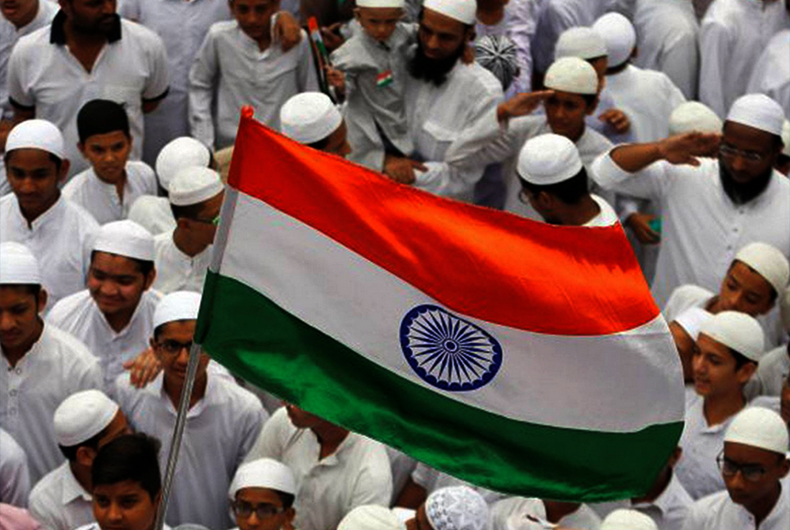NEW DELHI: Why are some political leaders creating social division and bitterness in the name of Muslim rights, reservations, and interests?
During and after the Lok Sabha elections, Rahul Gandhi’s Congress, Lalu Yadav’s RJD, Mamata’s Trinamool Congress, and the Samajwadi Party have been trying to solidify their vote banks by raising issues related to the Muslim minority community in India. These issues include the community’s Sharia laws, the rights of the Waqf Board, the situation of displaced Muslims due to events in Bangladesh, and more. Meanwhile, AIMIM’s leader Asaduddin Owaisi claims to represent Muslim identity while also being a nationalist. On the other hand, Prime Minister Narendra Modi and the Bharatiya Janata Party assert that their policies of “Sabka Saath, Sabka Vikas” (together with everyone, development for all) ensure that all sections, classes, and communities benefit from government programs and budgets. They claim there is no discrimination against minorities, which is why Muslim voters in several states have also voted for the BJP. The biggest evidence comes from Gujarat, where a CSDS survey showed that 29% of Muslim voters supported the BJP.
Leaders from the RSS, dedicated to Hindutva, have consistently stated that they consider 98% of Muslims born in India as Hindus and Indians, despite differences in worship practices. In line with this view, the Modi government is also campaigning for a Uniform Civil Code, with its draft already passed in the Uttarakhand Assembly.
So, the question arises: Why are some political leaders creating social division and bitterness in the name of Muslim rights, reservations, and interests? Who are the true nationalist leaders among them? In this context, it is worth recalling the stand taken by Muslim leaders themselves against communalism in the 20th century, before Independence.
The famous scholar and leader from Aligarh, Sir Syed Ahmad Khan, in his historic speech on Hindu-Muslim unity in Patna on January 27, 1883, said, “We breathe the air of India, drink the water of its rivers like the Ganges and Yamuna, and eat the grains grown on its soil. Our body colours are the same as living in India, we must acknowledge that our country is one, and the progress and well-being of the country depend on unity, mutual sympathy, and love. Discord, quarrels, and division will destroy us.” Not only this, he also said in a Hindu gathering in Punjab, “Every resident of Hindustan can call themselves a Hindu. I am saddened that you do not consider me a Hindu, even though I am also a resident of Hindustan.”
Similarly, during the Ganpati festival initiated by Lokmanya Tilak in Solapur in 1896, followers of all religions, including Hindus, Muslims, Sikhs, and Parsis, participated. A weekly newspaper of that time, Rafat Goftar, wrote, “Local Muslims joined the Ganpati processions and respected Lord Ganpati. In Nasik, a Muslim gentleman even led the Ganpati immersion procession.”
Currently, there is significant politics surrounding Bihar, Bengal, and the Muslims there. History bears witness that Lord Curzon implemented the plan for the partition of Bengal in 1903 specifically to break Hindu-Muslim unity. This led to sharp reactions in society, including a Swadeshi rally and an appeal to tie Rakhi. In 1905, Liaquat Hussain wrote to Surendranath Banerjee, stating that boycotting was the only solution to deal with the partition of Bengal. Conferences for Hindu-Muslim unity were held in Bihar in 1908 and 1909, and during that time, the influence of Hindu-Muslim leaders on the public was significant. However, the partition of Bengal and the country itself eventually happened due to the British. But is there any major nationalist Muslim leader today like there was then?
Salman Khurshid, who has held prominent positions in the Congress party for decades, or Adhir Ranjan Chowdhury in Bengal, cannot win elections or help others win in their Muslim-majority constituencies. The leaders promoted by the RJD, Samajwadi Party, or Sharad Pawar’s divided NCP have not gained the trust of the Muslim community in any state due to their criminal activities.
Owaisi managed to influence Hyderabad and a few other constituencies. Despite their propaganda and domestic and foreign support, these leaders claim to be the custodians of the entire Muslim community’s interests.
The state with the highest Muslim population in India is Jammu and Kashmir, where Muslims comprise 68.31% of the population. Mufti Mohammad Sayeed was the Chief Minister of Jammu and Kashmir and also served as India’s Home Minister during the brief tenure of V.P. Singh, who had left Congress.
He was the president of People’s Democratic Party. Uttar Pradesh is the most populous state in India, housing 16.51% of the country’s total population. In the 2011 census, Uttar Pradesh’s total population was 199.8 million, with 38.4 million Muslims.
This means that Muslims represent 20.26% of the state’s total population. This is why the importance of the Muslim vote bank in Uttar Pradesh’s political chessboard cannot be ignored. The electoral outcomes of various political parties here largely depend on Muslim leaders. Some of these influential and dominant leaders include Azam Khan, Mukhtar Ansari, Naseemuddin Siddiqui, Imran Masood, Shafiqur Rahman Barq, Nahid Hasan, Haji Fazlur Rahman, and ST Hasan, among others. However, their influence is limited and their impact is minimal in other states.
In the 2024 Lok Sabha elections, 78 Muslim candidates contested, including independents. In contrast, 115 Muslim candidates contested in 2019. This time, 24 Muslim MPs were elected to Parliament, including 7 from Congress, 4 from the Samajwadi Party, 5 from TMC, 3 from IUML, 2 from the National Conference, and 2 independents. Notable figures among them include Yusuf Pathan, Asaduddin Owaisi, and Ikra Chaudhary. Despite this, is there a single Muslim leader with significant influence over the approximately 200 million Muslim population?

